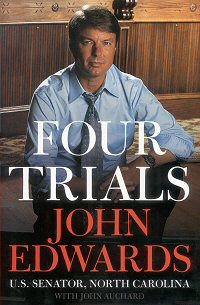Review: Four Trials

- Title
- Four Trials
- Author
- John Edwards, U.S. Senator, North Carolina; with John Auchard
- Publisher
- New York: Simon & Schuster, 2004
- ISBN
- 0-7432-4497-4
Review Copyright © 2004 Garret Wilson — 16 January 2004 1:43pm
John Edwards is a decent, hard-working man from a mill town who learned how to be decent and hard-working from his mill family. John likes the people he represents in Four Trials because they, too, are decent, hard-working people who might well have been from mill towns. These clients are in many ways just like John Edwards who, in case you didn't know, is a decent, hard-working man who has never forgotten the mill town he came from.
Those facts being firmly settled, Four Trials is a great book in which John Edwards, lawyer and U.S. Senator from North Carolina, outlines four of his most significant civil trials as they relate to his life and career as a lawyer and senator. I'm always skeptical about ghost writers (Four Trials is written by "John Edwards … with John Auchard"), never knowing which words (if any) actually come straight from the author, but after a while I consoled myself when I realized that, had the book been by another author only claiming to write how John might have felt, I would have enjoyed the book; I should surely enjoy no less an autobiographical book that uses a co-author.
It's strange, though, that a co-author who is a professor of English and a writer for The Washington Post would allow such grammatical errors as, "[Howard Sawyer] stocked up on baseball cards, penknives, and the like—for clients' kids and even for friends of their kid's [sic]." (2) ("Kids" should have no apostrophe.) Similarly, it grates on the senses to read that, "[I]t became apparent that those nurses were towing [sic] a company line," when surely they were only toeing the line. (89). Again looking for consolation, I consider the possibility that these mistakes reflect sections actually authored by John Edwards—who is not an English professor but a decent, hard-working man from a mill town.
The style is simple, yet lively and full of information. The book can be read in a couple of days. While the writing might not win any awards, it has its share of flowing beauty:
"Do you know where we are, Valerie?" I asked [the young girl who was the plaintiff in the trial, who had experienced her intestines being ripped out from the suction of a swimming pool pump because of an improperly fastened pump intake cover created by the defendant].
Her voice was only a whisper, or maybe less than a whisper, "A courtroom."
"That's right. And do you know who this man is?"
"The judge."
"And do you know who those people are?"
She stared at the twelve men and women looking at her from behind the wooden railing.
"My jury."
Her jury melted. (206).
The book deals easily with complicated courtroom procedures, and brings enough suspense that, though the writing and situations may not equal those of a John Grisham novel, the fact that these stories are real make this book equal or surpass many a Grisham mystery. You're there with John as he plays Perry Mason, determining the damages owed to a child whose parents were both killed through the negligence of a truck driver:
"You also indicated in calculating [such an unreasonably low] value of loss of services that you assume that half of [the father's] services would have gone to his wife, and half to [the son]?"
"That's right."
"Are you aware that his wife is dead?"
Gulp. (152).
The book makes you feel like you're there to experience first-hand the aspects of a court proceeding that no one could ever predict, such as a prosecution witness who proudly displays to the jury the kidney stone he had just passed in the bathroom, causing the trial to be delayed. (220). And while you only get a brief glimpse of the heartache that comes from John's losing his son Wade to a freak road accident, the account is written such that you'll never doubt that this loss permeates John's existence, from the cases he brings to trial to the family that he continues to raise while serving as U.S. Senator.
It's no surprise that, as John Edwards is currently running for President of the United States the year the book is published, Four Trials would make sure you know that John is in many ways a common person who has never forgotten his roots, a man who still calls his mother "mama." Looking beyond the obvious, however, Four Trials more than makes good on whatever promises it makes of entertainment, suspense, and reality. John's book is highly recommended because it's a short read, yet a good read, with a core of committment mixed with excitement and emotion that will appeal to your inner idealism—especially if you're a decent, hard-working person just like John Edwards who (did I mention?) has never forgotten what he learned growing up among decent, hard-working people in a mill town.
Copyright © 2004 Garret Wilson